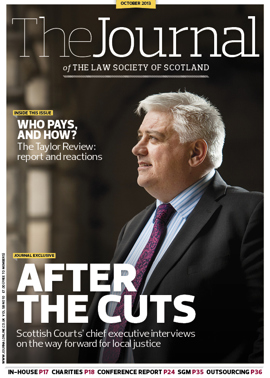Heir finding: the sensitive side

An individual is contacted by someone claiming to be from a professional genealogy company, who informs them that they are in line to succeed to a share of the estate of a distant relative of whom they may not even have heard. How do they check whether the call is genuine, and how should they react?
They would be wise to make certain checks. Although one might not immediately identify such news as potential scam territory, it could happen if, for example, a fee payment is requested and made up front and the supposed searcher then disappears, or personal details sought to establish the beneficiary’s identity are then used to commit fraud.
Of course, there are many established companies working in the field, and there are different ways of working and charging. Advice published online by the Society of Genealogists (SoG: www.sog.org.uk) notes that there is “instructed” and “uninstructed” work: “On the uninstructed side, it is a common practice and it’s accepted that companies that have gone to the bother of tracking down the heirs will want to charge the beneficiary a contingency fee that is equivalent to a percentage of the inheritance. On the instructed side, it is more usual for there to be a predetermined fixed fee that will come out of the estate expenses before any residue is distributed to the heirs.”
The Society, and some companies who undertake the work, also offer advice to people who receive an approach. This includes asking for the name of the deceased and their relationship to the enquirer, contact details of anyone acting in the estate administration, and if a contingency fee is proposed, the size of the inheritance that would be subject to the fee. No one should feel under pressure of time to sign an agreement, as rights of inheritance cannot be lost through a refusal to sign, and if possible seek advice before signing a percentage fee agreement.
Many such companies operate from south of the border, but one Scottish-based operation is Eadie Corporate Solutions, founded by former Detective Chief Inspector Alan Eadie.
Preferring to describe himself as a “beneficiary investigator” rather than “genealogist”, Eadie says he always works to the instructions of solicitors’ firms, charging them an agreed hourly fee, and his practice on locating a beneficiary is to write in the first instance by recorded delivery before attempting telephone or face-to-face contact.
“I’ll explain who I am, where our website is, even give them the name and phone number of the issuing and instructing solicitor so that they can check out my credibility and background before picking up the phone and calling me,” he emphasises. “It gives them that bit of trust when they deal with me from the outset.
“The key word is credibility, not just with the client, but with the people we trace. Once we’ve got their trust and they see that we’re credible, we can do all the business on behalf of the lawyer, securing all the documentary evidence legally required from beneficiaries to prove their identities.”
Though well placed to carry out on-the-ground work in Scotland for local firms, Eadie has noticed a growing trend for enquiries to turn up an international element. “I would say maybe about 40% of our work has stretched outwith the Scottish border. We’ve carried out investigations and tracked people in the USA, Canada, Australia, New Zealand, South Africa, and all over continental Europe, so although it starts with a Scottish case, the tentacles often spread out the way.”
He and his ex-police colleagues take some pride in not giving up on a search. One case concerned a man resident in San Francisco who died 45 years ago in quite tragic circumstances. Although a genealogy company reported that he had left no family, the client remained unsure, and Eadie managed to trace two children to Massachusetts, despite the family having a fairly common surname.
“Experience is hugely important,” Eadie observes, “but equally important, is people appreciating that their cases are dealt with in a sensitive manner, and client trust that they are represented in a professional way during investigations. Such feedback is what makes this job worthwhile.”
In this issue
- Jewel in the crown, or just red tape?
- In the public interest
- Sweeney: room for manoeuvre
- Lost in translation?
- EU Fundamental Rights Agency: the missing link?
- Reading for pleasure
- Opinion column: Stephen Gold
- Book reviews
- Profile
- President's column
- FM officially opens new MBH
- Feeling the squeeze
- Litigation: a numbers game
- Mythbusting! The in-house IT top ten
- Charities and the changing legal landscape
- Heir finding: the sensitive side
- Sign up to boost charity giving
- Law, but not as we know it
- All the permutations
- The truth, the whole truth...
- Shale gas: a complex process
- Expenses up to date?
- Scottish Solicitors' Discipline Tribunal
- Room at the top?
- Here comes the flood?
- SGM decision kills "sep rep"
- Outsourcing: the straight and narrow
- How not to win business: a guide for professionals
- Properly engaged?
- Ask Ash
- Sep rep: what now?
- From the Brussels office
- Law reform roundup






